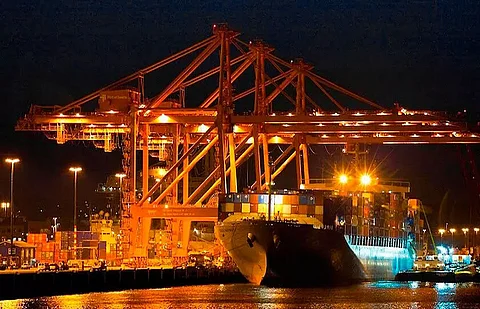
- Home
- Live Blog
- Breaking News
- Top Headlines
- Cities
- NE News
- Sentinel Media
- Sports
- Education
- Jobs

India's persistent efforts to strengthen bilateral relations with Bangladesh under the 'Neighbourhood First Policy have brought huge opportunities for north-eastern states to unlock the region's untapped potential. Bangladesh Prime Minister Sheikh Hasina offering India the Chittagong Port for use by north-eastern states clearly demonstrates the significance of this foreign policy initiative taken by India for the landlocked region. India and Bangladesh putting the issue of repatriation of illegal Bangladeshis from the Northeast on the high table of diplomacy are critical to sustaining and deepening bilateral relations. Prime Minister Hasina during her discussion with Indian External Affairs Minister (EAM) S Jaishankar, when the latter called on her at Dhaka, underlined the need for enhanced connectivity between the two neighbouring countries which, she said, would particularly benefit north-eastern states like Assam and Tripura in using the Chittagong Port. Bangladesh's offer is expected to boost India's confidence to fast track a set of connectivity projects currently under execution. EAM Jaishankar conveyed Prime Minister Narendra Modi's invitation to Prime Minister Hasina to visit India at her convenience later this year. He also described Bangladesh as the most important country for India in its foreign policy objective under the Neighbourhood First Policy which underlined the importance India accords to cross-border projects between the two neighbouring countries through the north-eastern region. These projects including the Agartala-Akhaura rail link, when completed and commissioned, will provide the north-eastern region with direct access to the sea route through Chittagong Port. This access was lost in 1965 during the India-Pakistan war when the region had borders with erstwhile East Pakistan before the birth of Bangladesh in 1971. The entire north-eastern region became landlocked, which had a cascading impact on its growth and development and the region continues to grapple with poverty, backwardness, and unemployment in perpetuity for more than 57 years on account of lack of investment and market access. Unabated infiltration of people from erstwhile East Pakistan since the partition even after the creation of Bangladesh to Assam, Tripura and other states in the region aggravated the crisis as it led to a demographic change posing existential threats to the linguistic and cultural identities of the indigenous people. Brushing this issue aside as India's domestic politics is not a wise approach as the problem has historical context in the birth of Bangladesh, and India helped its liberation from Pakistan which had its direct fallout on the Northeast that continues to grip its people. Even though policies related to external affairs are not to be influenced by domestic politics of the countries engaged in bilateral and multilateral relations, the vexed problem of repatriation of illegal Bangladeshi migrants can be decided only through the bilateral mechanism. The access to Chittagong Port for the region will facilitate increasing inter-dependence for mutually beneficial trade, commerce and tourism. This, in turn, is expected to generate confidence among the people of the northeast in India and Bangladesh to resolve contentious issues through sustained dialogue with an attitude of standing by each other's crisis. Expediting the connectivity projects for access northeast to seaports in Bangladesh and bilateral resolution of the problem of Illegal migration of Bangladeshis to the region must not be allowed to become a chicken-and-egg situation. Access to the Chittagong Port and waterway connectivity through Bangladesh is crucial for faster connectivity between the northeast region and the rest of India. Improved connectivity will attract investors and industries to move to Assam and other states as it will provide them access to a larger market and easy access to the sea route. The development that will follow as a result of the new investment climate and ecosystem will generate employment opportunities, and it will wean away youth from the residual insurgency in the region. For allaying apprehensions of seamless connectivity facilitating new streams of migration of people across the border it will be imperative for both the countries to put in place a strict cross-border travel regime to ensure that no one enters without valid travel documents. India, Bangladesh and Nepal have already finalized the Memorandum of Understanding to be signed for the operationalization of the Bangladesh, Bhutan, India, Nepal (BBIN) Motor Vehicle Agreement for seamless movement of goods and passenger traffic in the three countries. A huge part of these movements is going to take place through the north-eastern region which explains the importance of a foolproof mechanism to ensure that illegal cross-border movements are prevented. Addressing such apprehensions is critical to generating enthusiasm among the people on both sides of the border to engage in trade and commerce, tourism, and cultural exchange for smooth movement of goods and services to be facilitated by the deepening bilateral relations between India and Bangladesh. The access of the north-eastern region to global markets via the sea routes of Bangladesh under India's 'Neighbourhood First' policy is no longer confined to diplomatic exercises only. It is fast becoming a reality.